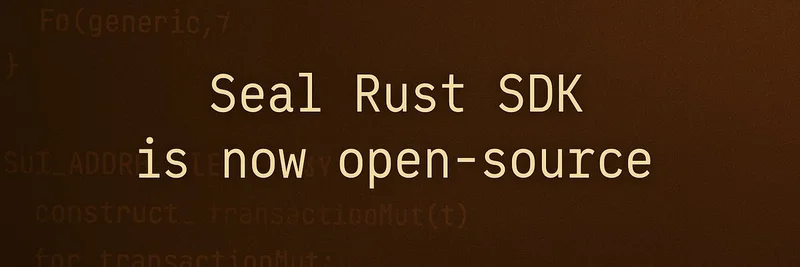If you're building on the Sui blockchain or just keeping tabs on Web3 innovations, there's some fresh news that's worth your attention. The Sui Network recently highlighted a major addition to their ecosystem: an open-source Rust SDK for Seal, crafted by developer Quentin (@gfusee33). This tool is set to make secure data management a breeze for Rust enthusiasts working in blockchain.
What's Seal All About?
First off, let's break down Seal in simple terms. Seal is a programmable access control system built on the Sui blockchain. It's like a smart lock for your digital assets and data in Web3. You can encrypt information—think messages, files, or even artworks—and set custom rules for who gets to unlock it. These rules, or policies, can be based on things like token ownership, time limits, or even thresholds (like needing multiple approvals). It's all about keeping things private, secure, and composable, meaning you can mix and match these features in your apps without hassle.
Seal leverages Sui's strengths, such as its high-speed transactions and low costs, to handle encryption and decryption efficiently. For blockchain practitioners, especially those in the meme token space, this opens doors to cool features like token-gated communities, encrypted meme drops, or secure vaults for exclusive content. Imagine locking away a rare NFT reveal until holders meet certain criteria—Seal makes that possible without trusting third parties.
The Big Announcement: Rust SDK Goes Open-Source
The buzz started with a post from Quentin, announcing the Seal Rust SDK as open-source. He pointed out that the Seal ecosystem on Sui was lacking a comprehensive SDK for Rust developers, and this new release fills that gap. The focus? Top-notch developer experience, blazing performance, and tons of flexibility.
Sui Network quickly amplified this with their own tweet, giving a shoutout to Quentin and linking to the Awesome Seal repository on GitHub. They described it as a "turnkey Rust SDK for Seal," simplifying tasks like encrypting data, setting access gates, and retrieving information securely on Sui.
Why Rust? It's a powerhouse language for blockchain dev, known for its safety and speed—perfect for handling sensitive operations like cryptography without the risk of common bugs.
Why This Matters for Developers and Meme Token Creators
For devs diving into Sui, this SDK means you can integrate Seal's features into your projects without starting from scratch. Whether you're building DeFi tools, gaming apps, or meme token platforms, it streamlines secure data flows. In the meme world, where community engagement is key, think about using Seal for encrypted airdrops or private channels that only token holders can access. It's a step toward more robust, user-controlled experiences in Web3.
The SDK is community-maintained and provides idiomatic bindings for core operations like interacting with key servers and managing policies. If you're ready to tinker, head over to the Seal Rust SDK repo to get started.
Broader Ecosystem: More Tools in the Seal Universe
This isn't just a one-off—Sui's got a growing list of Seal-integrated tools. The Awesome Seal repo curates them all, from infrastructure to full-fledged apps. Here are a few highlights:
- Sui Stack Messaging SDK: For end-to-end encrypted messaging in Web3 apps, complete with programmable policies.
- Distributed Key Vault: A zero-trust setup using Nautilus enclaves for super-secure key management.
- Tusky Token-Gated Access: Restrict content to specific token holders, ideal for exclusive meme communities.
- Projects like Zeroleaks and Sui Shadow: From anonymous whistleblowing to privacy-first art platforms, showing Seal's versatility.
For the full scoop, check out the official Seal site. As Sui continues to evolve, tools like this Rust SDK are making it easier for everyone—from hardcore coders to meme token builders—to level up their blockchain game.
Stay tuned for more updates on Sui and its ecosystem right here at Meme Insider, where we break down the tech behind the trends.



